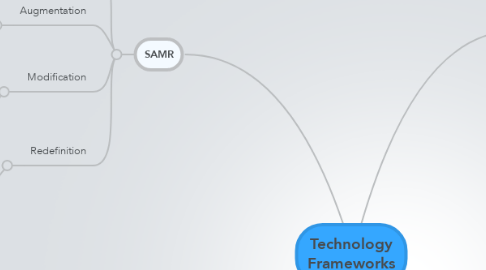
1. SAMR
1.1. Substitution
1.1.1. Computer technology is used to accomplish the same tasks that could be done without their usage.
1.2. Augmentation
1.2.1. Computer technology is an effective tool to perform basic tasks.
1.3. Modification
1.3.1. Common classroom tasks are being accomplished through the use of computer technology. This is the first step toward a transformation of traditional teaching.
1.4. Redefinition
1.4.1. Computer technology allows for the completion of new tasks that were previously impossible in the classroom. A fundamental shift in how both education is delivered and learning is accomplished.
2. The Philosophy of Teachnology
2.1. The belief about how technology can and should be used in one's teaching practices.
2.2. Use of technology is a way to teach students how to interact with vastly different cultures and ideas.
2.3. Technology can facilitate learning in ways never before possible. As teachers, we have a responsibility to show our students how to use technology in a safe and responsible way.
2.4. The teaching of 21st century thinking is essential in preparing students for life in a digital age.
3. TPACK
3.1. Technology
3.1.1. Knowledge in the use of technology such as computers and related software
3.2. Content
3.2.1. Knowledge in specific subject domain
3.3. Pedagogical
3.3.1. Knowledge in the area of teaching a subject domain
3.4. TPACK is the collective knowledge of all three of the above mentioned areas. This will help teachers to know what technologies to use and when to use them in order to design meaningful learning experiences for their students.
4. 21st Century Learning
4.1. Foundational Knowledge
4.1.1. Core Content
4.1.1.1. Using mathematical and scientific ways of thinking to solve everyday problems and understand the natural world.
4.1.2. Digital & Information Literacy
4.1.2.1. The ability to navigate, evaluate, and construct information using various digital technologies.
4.1.3. Cross-disciplinary Knowledge
4.1.3.1. Application of knowledge in different contexts across subject fields.
4.2. Meta Knowledge
4.2.1. Problem Solving and Critical Thinking
4.2.1.1. The ability to interpret information and use it to make informed decisions.
4.2.2. Communication and Collaboration
4.2.2.1. The ability to articulate oneself through different modes of communication while being respectful of others' opinions and ideas.
4.2.3. Creativity
4.2.3.1. The ability to apply any knowledge and skills gained to evaluate and refine existing ideas and products.
4.3. Humanistic Knowledge
4.3.1. Life and Job Skills
4.3.1.1. The ability to manage and organize one's efforts and to both recognize and use relevant and important information.
4.3.2. Cultural Competence
4.3.2.1. The ability to effectively communicate, collaborate, and appreciate the ideas and emotions of all types of individuals.
4.3.3. Ethical and Emotional Awareness
4.3.3.1. The ability to sense the feelings of others and use that to foster successful human interactions.
